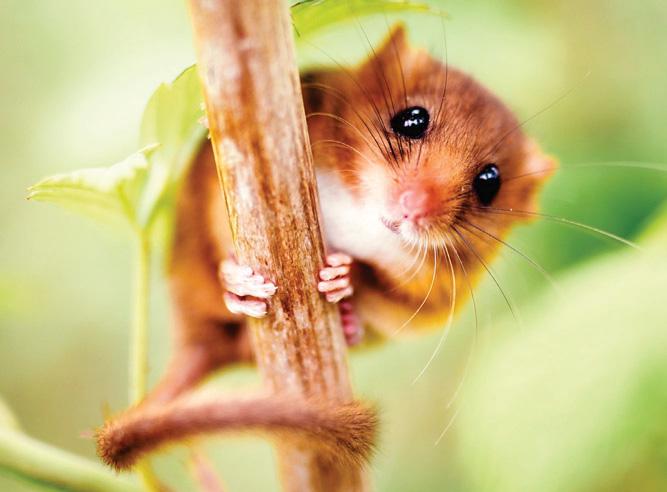Poging GOUD - Vrij
Wildlife watch
The Week Junior Science+Nature UK
|March 2025
As spring begins, Jenny Ackland shows you how to experience nature waking up.
-

March is the time when nature starts to wake up from its long winter nap. Hungry hedgehogs are up and about, and if you’re lucky you might catch a glimpse of them as they snuffle around gardens looking for juicy slugs and snails. Another creature making the most of the spring sunshine is the peacock butterfly. With its deep red wings, it brings a splash of colour as it flutters by. If you go out for a woodland walk, see if you can spot the white flowers and deep green leaves of wild garlic carpeting a shady forest floor.
Cherry trees are starting to bloom too, with delicate pink blossoms that fall like confetti when the wind blows. March is a great time to spot mining bees. These insects are smaller and less fuzzy than bumblebees, so are easily mistaken for wasps, but they are important pollinators.
Dit verhaal komt uit de March 2025-editie van The Week Junior Science+Nature UK.
Abonneer u op Magzter GOLD voor toegang tot duizenden zorgvuldig samengestelde premiumverhalen en meer dan 9000 tijdschriften en kranten.
Bent u al abonnee? Aanmelden
MEER VERHALEN VAN The Week Junior Science+Nature UK

The Week Junior Science+Nature UK
FIGHTING THE FREEZE
Claire Karwowski uncovers nature's wildest ways of fighting the winter freeze.
6 mins
Christmas 2025
The Week Junior Science+Nature UK
Cook up bioplastic decorations
Make your own eco-friendly ornaments.
1 min
Christmas 2025

The Week Junior Science+Nature UK
Should we switch off Christmas lights?
They brighten up the festive season, but they can have a negative impact on the environment.
1 mins
Christmas 2025
The Week Junior Science+Nature UK
Three spectacular illuminations
Glow Wild, Wakehurst
1 min
Christmas 2025

The Week Junior Science+Nature UK
THE LAST DAYS OF POMPEII
For the first time, an immersive exhibition about the destruction of the ancient Roman city of Pompeii has opened in London.
1 min
Christmas 2025

The Week Junior Science+Nature UK
Wildlife watch
Jenny Ackland unveils a winter wonderland of natural delights this festive season.
1 mins
Christmas 2025
The Week Junior Science+Nature UK
Make Snow globes
Create the perfect Christmas gift.
1 min
Christmas 2025

The Week Junior Science+Nature UK
Maggie Aderin-Pocock
Meet the scientist \"blasting off into space\" at the Christmas Lectures.
3 mins
Christmas 2025
The Week Junior Science+Nature UK
Make vegan eggnog
Whip up a dairy-free festive winter warmer that is perfect for cold nights.
1 min
Christmas 2025

The Week Junior Science+Nature UK
Octopuses
Meet the colour-changing, shape-shifting, fortune-telling aliens of the seas.
2 mins
Christmas 2025
Listen
Translate
Change font size

